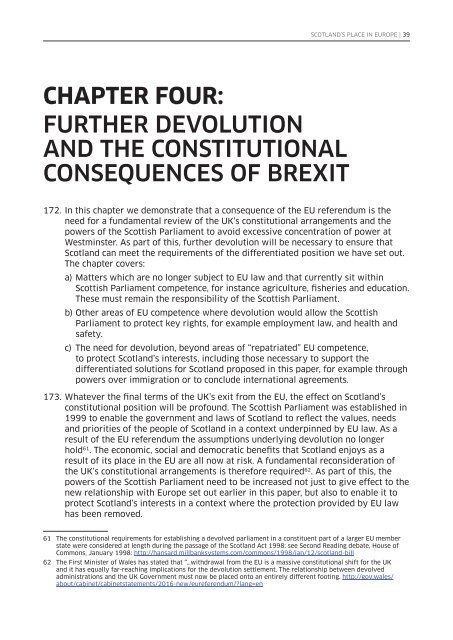Scotland’s Place in Europe
5tSyKxiOE
5tSyKxiOE
You also want an ePaper? Increase the reach of your titles
YUMPU automatically turns print PDFs into web optimized ePapers that Google loves.
SCOTLAND’S PLACE IN EUROPE | 39<br />
CHAPTER FOUR:<br />
FURTHER DEVOLUTION<br />
AND THE CONSTITUTIONAL<br />
CONSEQUENCES OF BREXIT<br />
172. In this chapter we demonstrate that a consequence of the EU referendum is the<br />
need for a fundamental review of the UK’s constitutional arrangements and the<br />
powers of the Scottish Parliament to avoid excessive concentration of power at<br />
Westm<strong>in</strong>ster. As part of this, further devolution will be necessary to ensure that<br />
Scotland can meet the requirements of the differentiated position we have set out.<br />
The chapter covers:<br />
a) Matters which are no longer subject to EU law and that currently sit with<strong>in</strong><br />
Scottish Parliament competence, for <strong>in</strong>stance agriculture, fisheries and education.<br />
These must rema<strong>in</strong> the responsibility of the Scottish Parliament.<br />
b) Other areas of EU competence where devolution would allow the Scottish<br />
Parliament to protect key rights, for example employment law, and health and<br />
safety.<br />
c) The need for devolution, beyond areas of “repatriated” EU competence,<br />
to protect <strong>Scotland’s</strong> <strong>in</strong>terests, <strong>in</strong>clud<strong>in</strong>g those necessary to support the<br />
differentiated solutions for Scotland proposed <strong>in</strong> this paper, for example through<br />
powers over immigration or to conclude <strong>in</strong>ternational agreements.<br />
173. Whatever the f<strong>in</strong>al terms of the UK’s exit from the EU, the effect on <strong>Scotland’s</strong><br />
constitutional position will be profound. The Scottish Parliament was established <strong>in</strong><br />
1999 to enable the government and laws of Scotland to reflect the values, needs<br />
and priorities of the people of Scotland <strong>in</strong> a context underp<strong>in</strong>ned by EU law. As a<br />
result of the EU referendum the assumptions underly<strong>in</strong>g devolution no longer<br />
hold 61 . The economic, social and democratic benefits that Scotland enjoys as a<br />
result of its place <strong>in</strong> the EU are all now at risk. A fundamental reconsideration of<br />
the UK’s constitutional arrangements is therefore required 62 . As part of this, the<br />
powers of the Scottish Parliament need to be <strong>in</strong>creased not just to give effect to the<br />
new relationship with <strong>Europe</strong> set out earlier <strong>in</strong> this paper, but also to enable it to<br />
protect <strong>Scotland’s</strong> <strong>in</strong>terests <strong>in</strong> a context where the protection provided by EU law<br />
has been removed.<br />
61 The constitutional requirements for establish<strong>in</strong>g a devolved parliament <strong>in</strong> a constituent part of a larger EU member<br />
state were considered at length dur<strong>in</strong>g the passage of the Scotland Act 1998: see Second Read<strong>in</strong>g debate, House of<br />
Commons, January 1998: http://hansard.millbanksystems.com/commons/1998/jan/12/scotland-bill<br />
62 The First M<strong>in</strong>ister of Wales has stated that “…withdrawal from the EU is a massive constitutional shift for the UK<br />
and it has equally far-reach<strong>in</strong>g implications for the devolution settlement. The relationship between devolved<br />
adm<strong>in</strong>istrations and the UK Government must now be placed onto an entirely different foot<strong>in</strong>g. http://gov.wales/<br />
about/cab<strong>in</strong>et/cab<strong>in</strong>etstatements/2016-new/eureferendum/?lang=en


